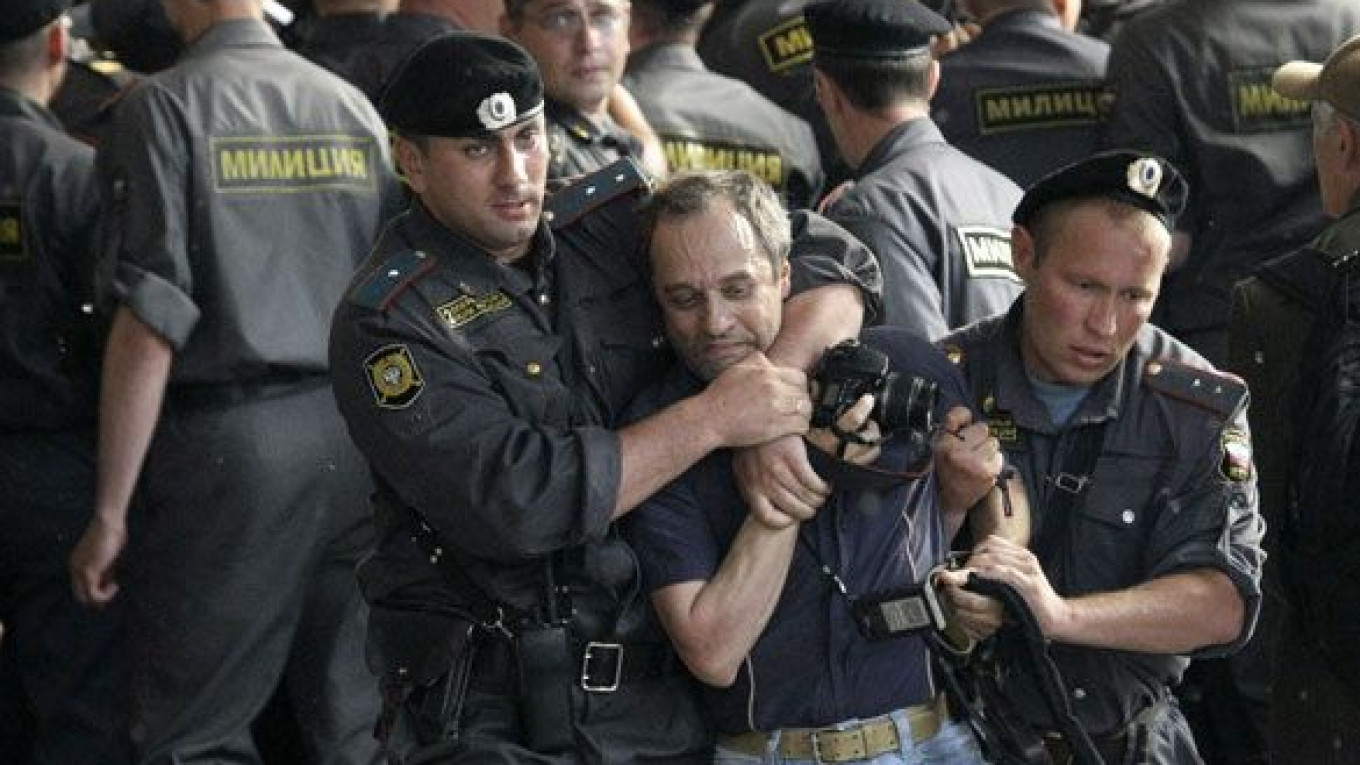Just two days after Prime Minister Vladimir Putin backed people's right to protest, police on Monday harshly cracked down on hundreds of protesters in Moscow and St. Petersburg, detaining at least 180.
More than 1,000 people gathered late Monday outside Moscow's Mayakovskaya metro station, chanting, "Disgrace!" and "Russia without Putin!" in support of Article 31 of the Constitution that guarantees freedom of assembly.
Moscow police spokesman Maxim Kolosvetov said no extra police officers were deployed to nearby Triumfalnaya Ploshchad in addition to the regular 1,300 officers who patrol the city center daily, although the square was surrounded with about 30 police buses Monday evening.
The square was occupied by 2,000 pro-Kremlin activists, many of them under 18, from the Young Russia and Young Guard youth groups, who arrived at 5 p.m. to wave flags and dance to patriotic pop songs at a blood drive. The thumping music grew noticeably louder an hour later when the protesters gathered nearby and began crying anti-government slogans.
Nina Kulichyova, 88, arrived covered with war medals and carrying a booklet containing the Constitution. When asked by the police to leave the unsanctioned rally, she pointed at Article 31 in the booklet.
With tears in her eyes, she said she could no longer live under Putin's rule. "I'm ready to apply for political asylum at any embassy," Kulichyova told The Moscow Times.
Yulia Bashinova, a 28-year-old journalist, came to the demonstration accompanied with her husband and 10-year-old niece.
"I came because I think that the right of freedom of assembly is a basic right in our country," Bashinova said.
After about an hour, police began rounding up protesters, shoving dozens into the waiting police buses. Three protesters managed to escape from a police bus but were pushed back inside. ?
About 130 protesters were detained, police said.
Fifty to 100 protesters were forcefully detained by police at a similar rally in St. Petersburg, rally organizers said.
Putin voiced support for public protests at a meeting with St. Petersburg intelligentsia on Saturday, saying they "don't hinder but, on the contrary, help" the government. He also said demonstrations should not hinder other people. Putin spoke after facing sharp criticism from rock musician Yury Shevchuk over police crackdowns on rallies like the one Monday.
Putin's remarks had stirred some hopes that the police might respond more peacefully to Monday's rallies, although his spokesman Dmitry Peskov said Sunday that Putin's words didn't offer anyone a license to rally.
Shevchuk said Monday on Ekho Moskvy radio that he had handed Putin a folder of complaints from various public organizations, including one protesting the planned reopening of a paper and pulp plant on Lake Baikal.
Rallies in support of free assembly, some of them unauthorized, were held in a total of 40 cities Monday, said Alexander Averin, an activist with The Other Russia opposition coalition.
Police detained 10 activists at an unauthorized rally in Kemerovo, but no one was detained in Saratov and Vladivostok, where the rallies were also banned, Averin told The Moscow Times.
Moscow and St. Petersburg authorities have repeatedly banned attempts by human rights activists and the political opposition to stage rallies in support of free assembly. Police, sometimes brutally, have broken up the protests, held on the 31st of every month that has 31 days in recognition of Article 31 of the Constitution that guarantees free assembly.
The government, wary of unrest amid the economic recession, has shown little tolerance for protests of any kind.
Federal ombudsman Vladimir Lukin told reporters near the Mayakovskaya metro station on Monday that it was unclear why the blood drive had been allowed and the opposition rally banned. "I will find a way to figure this out," Lukin said, Interfax reported.
A Message from The Moscow Times:
Dear readers,
We are facing unprecedented challenges. Russia's Prosecutor General's Office has designated The Moscow Times as an "undesirable" organization, criminalizing our work and putting our staff at risk of prosecution. This follows our earlier unjust labeling as a "foreign agent."
These actions are direct attempts to silence independent journalism in Russia. The authorities claim our work "discredits the decisions of the Russian leadership." We see things differently: we strive to provide accurate, unbiased reporting on Russia.
We, the journalists of The Moscow Times, refuse to be silenced. But to continue our work, we need your help.
Your support, no matter how small, makes a world of difference. If you can, please support us monthly starting from just $2. It's quick to set up, and every contribution makes a significant impact.
By supporting The Moscow Times, you're defending open, independent journalism in the face of repression. Thank you for standing with us.
Remind me later.


